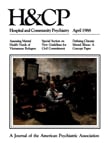Assertive Case Management in Three CMHCs: A Controlled Study
Abstract
At three community mental health centers (CMHCs) in Indiana, 167 clients at risk for rehospitalization were randomly assigned to experimental groups receiving assertive case management (ACM) or to control groups eligible to receive all other aftercare services at the centers. During a six-month follow-up period, experimental clients received an average of one visit a week from the ACM team, usually in the client's home or in community settings. Overall, ACM clients were rehospitalized an average of 9.2 days, significantly less than the 30.8 days for controls. In two of the three centers, significant rehospitalization differences were also found between ACM and control groups. No differences were found between groups in quality of life, medication compliance, involvement in CMHC programs, or contacts with the legal system in any of the centers. The most cost-effective center had savings of about $5,500 for each ACM client.
Access content
To read the fulltext, please use one of the options below to sign in or purchase access.- Personal login
- Institutional Login
- Sign in via OpenAthens
- Register for access
-
Please login/register if you wish to pair your device and check access availability.
Not a subscriber?
PsychiatryOnline subscription options offer access to the DSM-5 library, books, journals, CME, and patient resources. This all-in-one virtual library provides psychiatrists and mental health professionals with key resources for diagnosis, treatment, research, and professional development.
Need more help? PsychiatryOnline Customer Service may be reached by emailing [email protected] or by calling 800-368-5777 (in the U.S.) or 703-907-7322 (outside the U.S.).



